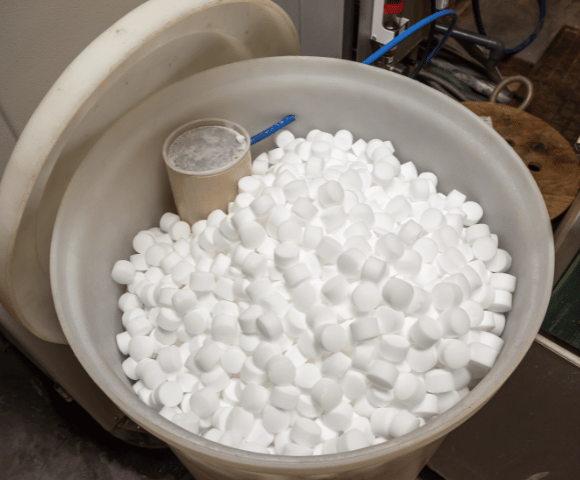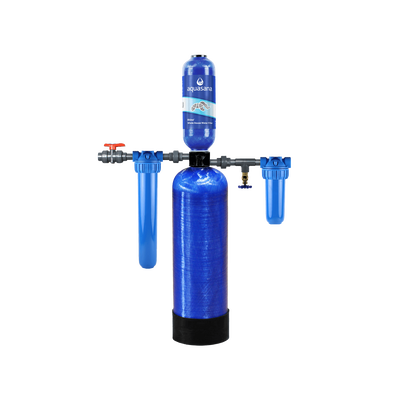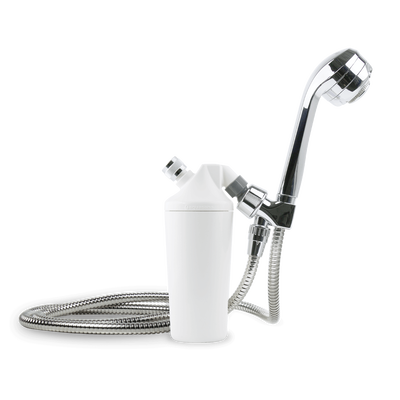The difference between hard and soft water
As you consider getting a water softener for your home, it is important to understand the differences between hard and soft water.
Hard water is very common in the United States. In fact, the U.S. Geological Survey (USGS) estimates that around 85% of U.S. homes have hard water. However, both hard and soft water occur naturally. Hard water gets its name from the high levels of minerals, like calcium and magnesium, that it contains. While many signs of hard water are tangible, you can also confirm it through a home water test kit or by checking your local water provider’s quality report. Water with more than 7 grains per gallon (gpg) or 120 milligrams per liter (mg/L) of minerals is classified as “hard.”
Soft water, on the other hand, lacks these minerals and thus doesn’t have problems associated with mineral buildup. It doesn’t leave deposits or streaks on dishes and clothes; it won’t dry out your skin and hair, and it won’t create scale buildup in pipes and appliances. You’ll also notice that soft water doesn’t have a bitter and chalky taste.
Whether you have hard or soft water largely depends on the area you live and where you get your water from. Hard water is most common in the Southwest and upper Midwest regions of the U.S., and you’re more likely to have hard water if you rely on a private well over publicly provided water from your municipality. This is because groundwater has a lot of contact with layers of rock and soil, giving it more time to accumulate deposits of hard minerals.
Pros of a water softener
Installing a water softener offers several benefits that improve your home, protect your appliances, and enhance your daily routines.
1. Healthier skin and hair
Without the harsh minerals found in hard water, your hair and skin will feel noticeably different. Hard water strips your body’s natural oils away, leaving hair brittle and skin dry or irritated. With softened water, your natural oils are preserved, giving your hair a softer, more manageable feel and leaving your skin moisturized and less prone to irritation after showers or baths.
2. Protect pipes and improve water pressure
The minerals in hard water can cause serious issues for your plumbing by increasing pipe corrosion or creating clogs. Over time, these clogs restrict water flow, resulting in poor water pressure and, in extreme cases, burst pipes. Water softeners remove hard minerals at your home’s main water line, which helps your pipes remain clear to ensure smooth water flow and consistent water pressure throughout your home.

3. Longer lifespan for household appliances
Limescale doesn’t just affect your pipes — it can also build inside household appliances like dishwashers, washing machines, and water heaters. This buildup forces appliances to work harder, using more energy and decreasing their lifespan. A water softener prevents limescale from accumulating, helping your appliances run more efficiently and reducing the need for costly repairs or replacements.
4. Streak-free dishes
One of the most obvious signs of hard water is spotted or streaked dishes, glassware, and silverware. These white spots or cloudy film occur because the minerals in hard water are difficult to rinse away. A water softener eliminates these minerals, leaving your kitchenware clean, shiny, and free of soap scum or residue after washing.
5. Longer-lasting laundry
Hard water can take a toll on your clothes, causing colors to fade and fabrics to feel stiff or rough. Over time, the minerals in hard water can even weaken fabrics, leading to holes. A water softener helps you preserve your clothes by using water that’s more gentle, so your favorite threads stay soft, bright, and comfortable for longer.
6. Improves cleaning product effectiveness
Hard water minerals reduce the ability of soap to lather, which requires you to use more products when cleaning. This means you’ll have to spend more on soap, detergent, and general cleaning products to get the job done. By using a softener, you’ll find that soap lathers better and you can do more with less, saving you money long-term.
7. Better tasting water
The minerals in hard water give it a distinct taste that you may detect when drinking or cooking with it. Hard water has a bitter or chalky taste which can make it unappealing to drink and influences the flavors of the food you cook. Using a water softener eliminates these elements so your water is more enjoyable to drink and it enhances the taste of the meals you make.
Cons of a water softener
While there are many advantages of a water softener, there are some disadvantages and considerations you should know before getting one for your home.
1. Upfront and installation costs
While water softeners can help you save money long-term, they can cost upwards of $1,500 on average or more if you require professional installation. Given the considerable costs, you’ll need to determine if the severity of your hard water warrants getting a softener sooner rather than later, or even at all. If you have water that’s only slightly hard, you may decide that you can wait a while until getting a softener or may decide not to get one at all. However, if you have water that’s moderately hard, it’s worth getting a softener soon to avoid costly repairs or replacements on pipes and appliances.
2. Maintenance
Water softeners need regular maintenance to keep them running efficiently, which includes refilling the salt tank and occasional cleaning to ensure optimal performance. While this upkeep is relatively simple, it’s important to factor it into your decision. If you prefer as little maintenance as possible, a Salt-Free Water Conditioner may be a better choice.

3. Environmental Impact
Water softeners are less eco-friendly than alternatives like conditioners because they generate wastewater and require electricity, which may be a consideration for some. However, softener efficiency varies from product to product, and some are better than others. For example, Aquasana water softeners use 50% less salt and 28% less water* than conventional softeners.
4. Legal limitations on usage
Some states and municipalities have restrictions on water softeners that limit if, or how they can be used. Dozens of communities throughout California have banned the use of water softeners, while Texas only allows softeners to be used if conservation standards are met. Other states like Connecticut, Michigan, and Minnesota may have restrictions on brine discharge or are taking measures to discourage softener usage. It’s important to check local regulations before purchasing a water softener to ensure it’s allowed in your area or any applicable limitations on how a system can be used.
Choose the right system for your home
While water softeners come with considerations, there’s no doubt that they are the most effective means of combating hard water. If the pros outweigh the cons and you decide that a water softener is right for your home, Aquasana offers systems to meet your needs. Our SimplySoft® 40,000 Grain Softener and SimplySoft® 60,000 Grain Softener are IAPMO certified to NSF/ANSI Standard 44 for the reduction of water hardness and to CSA B483.1. Compared to conventional softeners, ours also use 50% less salt and 28% less water*, which makes them more eco-friendly.
WHOLE HOUSE WATER SOFTENER
SimplySoft® 40,000 Grain Softener
Reduces minerals that cause hard water, providing softer, scale-free water from every tap in your home.
.png)
For homeowners seeking an alternative to water softeners, water conditioners can be an excellent option. Aquasana’s Salt-Free Water Conditioner can address hard water without the use of salt and it does not require electricity or generate wastewater. However you decide to address hard water, Aquasana has a solution to help. Shop our entire product collection to learn how we can help improve your water quality, or contact our water experts for additional information.
* Based on metered operation mode compared to standard time-based regenerated softeners.


